The poet Philip Larkin might be said to have been the bard of modern Britain, narrating the post-war transition from a boasting, marauding Empire to a world of rickety consumer goods, stale cigarette smoke – and everywhere, the smell of mildew and rain on concrete. But startling new research has revealed that this most modern of poets apparently based his best known poem on a medieval manuscript. In fact, “The Whitsun Weddings”, published in 1964, is not an original composition at all but a translation of a much older work entitled Hvítasunnubrúðhlaupin.

Professor Kaj Kage of the Leyton Technical Institute identified the manuscript: “Every now and then my bookseller, Johnny Openhouse on Paradise Street, gives me a tip when he hears of a manuscript fragment on the market. They’re normally grotty old bits of Books of Hours, but he hit the jackpot this time”. Prof. Kage was able to view and photograph the fragment before it was sold to a private collector, and in that time he transcribed the poem. “It was a bizarre piece. The language is Old Norse but the setting is in England. It seems to tell the story of someone following a wedding procession by carriage, and as the procession travels on, more wedding parties join the caravan”. Larkin’s poem tells the story of someone (presumably Larkin himself) riding a train from Hull to London which picks up couples beginning their honeymoons at each station it passes. “It’s not hard to see where Larkin got the idea!”, smirks Kage.
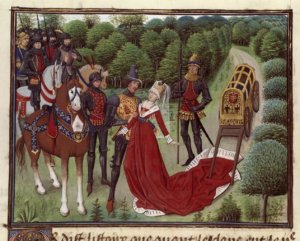
The professor points out that the form is unusual for Old Norse poetry: “It’s normally very strict stuff, but this poem has a much looser, more dream-like quality. I can only think of one other poem that even approaches this level of metrical depravity: A scatological mental breakdown of a poem called Grettisfærsla”. Pressed to explain the origins of Hvítasunnubrúðhlaupin, Prof. Kage suggests that it may have been composed by an Icelander visiting the East Midlands or perhaps East Anglia in the 1400s. “The poet refers to the ancient Kingdom of Lindsey, which today is in Lincolnshire, and they conclude their journey in London”, says Kage. “Although they occasionally use archaisms, including some gauche references to Old Norse mythology, there are a few later constructions which make me confidently place the poem in the Late Middle Ages”.

But if Larkin borrowed the general premise of The Whitsun Weddings from Hvítasunnubrúðhlaupin, how close is the parallel otherwise? “Well, there’s no doubt that Larkin modernised a lot of details. Let me give you some examples. The original has ladies wearing guðvefir glófar (“god-woven gloves”) which Larkin makes into plain-old “nylon gloves”.
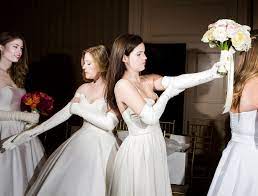
The original has the procession passing allvangr einn … stöpull einn (“a muster field … a steeple”) which Larkin hilariously turned into “An Odeon … a cooling tower”. The poet’s use of mythological references is also a striking difference. The Old Norse original speaks of kílar meinblandnir með löðri Élivága (“streams polluted with the froth of Élivágar”) – Élivágar were poisoned streams in the other world according to Old Norse myth.
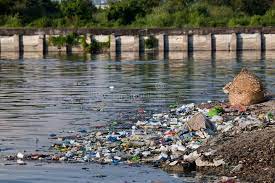
Larkin makes it a bit more mundane: “Canals with floatings of industrial froth”. The poet also refers to one of the Norns – beings that decide ones fate – called Verðandi: … búit at leysask með efnit er Verðandi gefr “ready to be released with the promise that Verðandi gives”. Larkin has “ready to be loosed with all the power / That being changed can give”.
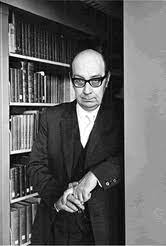
How did Larkin come across the Old Norse poem though? Prof. Kage responds excitedly: “Well, Larkin was employed as the librarian at the University of Hull from 1955 until 1985. It may be that he came across the poem there, perhaps shown to him by an academic or a local antiquarian bookseller”. Kage is unsure whether Larkin saw the very same manuscript fragment uncovered by Johnny Openhouse. “He might have done, but there may also be another manuscript witness somewhere in the Hull area”. The professor points out that there were Icelanders operating in Eastern England in the middle of the 1400s, especially in Hull: “The project England‘s Immigrants 1330-1550 lists 43 Icelanders in fifteenth-century Hull. Could one of them have been the poem’s original author?”.
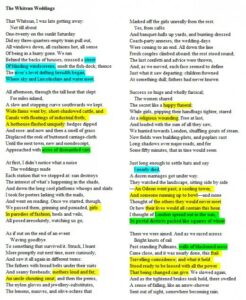
Professor Kage pauses for a moment before revealing whether he prefers Larkin’s modern update of the poem or the Old Norse original. “The Old Norse version is a bit mad, really. I think Larkin made it more serious, and he certainly made it more beautiful”. But the professor isn’t willing to dismiss his discovery entirely: “There are a few places where the Old Norse stumbles into beauty, even if it does so in the way that I have been known to stumble into Kebabish at 3.00 o’clock in the morning angrily waving a tenner and demanding to be stuffed with fish pakoras. There is that line of Larkin’s which describes the train ride as “this frail travelling coincidence”. It’s a line that stays with you. The Old Norse stays with me, just as doggedly: þessi skrjúpa sinnanda samkvæmd”.
Prof. Kage has provided readers of Lingoblog with a transcription of Hvítasunnubrúðhlaupin and a translation into modern English, ahead of their publication in a competitive, international academic journal. He also reads the poem aloud here: https://bit.ly/3ryPjFj. Larkin’s version can be read here and is read by the author here.
| Transcription | Translation |
| Á þeirri hvítasunnu, mér seinkaðisk: Eigi unz nóntíð leið á inum sólrauða sunnudegi fór mín brúðgumareið þrír fjórðunga tóm, ǫll vindauga opin, allir pallkoddar heitir, allr hrapaligr ferðahugr var farinn. Vér hlupum fyrir aftan hryggina húsa, sóttum stræti skuggsjáa blindandi, drógum nasir af fiskahǫfn; þaðan in rekanda jafnbreidd árinnar hófsk, þar er loftit ok Líndisey ok vatn mætask | On that Whitsun, I was delayed Not until nones passed on the golden-sunned Sunday did my bridegroom’s procession leave, three quarters empty, all windows open, all cushions hot, all rushed preparations for travel gone. We leapt behind the backs of houses, passed a street of blinding mirrors, whiffed fishdocks; thence the drifting equal breadth of the river began, there where sky and the Kingdom of Lindsey and the water meet |
| Um aftaninn, allt í gegnum inum háum hita er svaf yfir mílum á land upp, héldum vér hlykk seinlátan ok haltan. Víðir bæir liðu um, auk fé lágskyggð, ok kílar meinblandnir með lǫðri Élivága; baðstofa leiftraði einfaldliga: hagar sukku ok upprísu: en endr ok sinnum ilmr grass raskaði reykinum reiðarklæðis seymt unz in næsta borg, ný ok einfǫld, nálægjask með dagsláttum vagna, brugðinna á eintali. | In the late afternoon, all the way through the tall heat which sleptfor miles inland, we maintained a curve, slow and halting. Wide farmsteads went by, as well as short-shadowed cattle, and streams polluted with the froth of Élivágar. A bathhouse flashed uniquely: hedges sank and rose again, and now again the aroma of grass replaced the smoke of the embroidered cloth of the procession until the next town, new and simple, drew near with abandoned wagons, taken apart |
| At fyrsta sinn, merkti ek eigi hvé þysmiklar brúðhlaupin váru á hverjum stað: Sólin glatar áhuganum um þann er atberr í forsælu, ok niðr á inum lǫngu þǫnum, skrækir ok óp sýndisk mér at vera portarar, leikandi með bréfapǫkkum, ok svá las ek enn. En þó, þegar vér hófumsk at ganga fram hjá þeim, glottendum ok smurðum, meyjum í sundrgerðarkaupi, uppháva skúa ok blaka, allar standandi tortryggiliga, haldandi vǫrð meðan vér fórum | The first time, I did not notice how raucous the weddings were in every place: The sun destroys interest in what is happening in the shade and down on the long stretching racks, shrieks and cries, seemed to me to be porters, playing with sacks of letters and so I read on. However, at once we began to approach them, grinning and anointed, maidens in the best clothes they could purchase, raised shoes and shawls, all standing watching, holding a vigil while we went |
| Sem þær váru á odd viðburðar gefandi handarveif Nǫkkru er lifði hann. Þat lá á mér, svá at ek studdi greiðligar út næsta, ok meiri forvitinn, ok endrsá ek allt, nú með nýja skyn: Feðurnir með breiða linda undir kyrtlum sínum ok enni hrúkkótt; mæður mǫrvuð með hámælgi; Frændi einn er kallaði illkyngi; ok svá faldarnir, Guðvefir glófar ok vesalar gørsemar, In sǫla, purpura, in mórauða, sem | As though they were on the sharp end of an event, offering a wave to something which survived it. It impressed me, so that I leant out more carefully next time, and more curious, and I saw everything again, now with new understanding: The fathers with broad belts under their tunics and wrinkled foreheads; marrowy mothers with loud voices; One kinsman who shouted lewd things; and then the headdresses, Fine-woven gloves and pathetic jewels, the pale yellow, purple, reddish-brown, which |
| skildu meyjurnar frá ǫðrum einleikin Já, frá sǫlunum ok veizluhǫllunum, ok herbergjum, brúðkaupsdǫgunum skulu lokit. Um endilangt kom ný hjón. ǫnnur þrumuðu; It síðasta ráð ok inir glingar urðu gefin, ok, er vér héldum áfram, hvert andlit sýndisk at segja hvat þat sá ferr brott: bǫrn grettask um nǫkkurt óskemtiligt; feðurnir hǫfðu aldrei kennt | divided the maidens uncannily from the others Yea, from the halls and meadhalls, and lodgings, the wedding days were coming to an end. From end to end there came new couples. Others loitered; The last advice and trinkets were given, and, as we carried on, every face appeared to say what it saw departing: Children frowned about something dull; the fathers had never known |
| eitt gengi svá stórt ok allbrosligt; Konurnar deildu rúnirnar sem erfi glatt; Meðan meyjur, sem færask fyrirskyrtur sínar í fang traustligari, stǫrðu á eina heilaga særingu. Loksins frjáls, ok laðin við ǫllum sem þau sáu skyntum vér at Lundúnum, með skriðljós sótig. Nu varð akrar til borgarsmíð, ok espi skyggðu yfir trollahlǫðum, ok um litla stund, sem at síðustu sýndisk | success so great and wholly laughable: The women shared the runes like a happy funeral; While maidens, who gripped more firmly at their aprons, stared at a sacred wounding. Free at last, and laden with all they saw we hurried towards London, with sooty lanterns. Now fields became the building of fortifications, and aspens cast shadows over the works of trolls, and in a little while, which at last seemed |
| Gnóg langt at setjask kufla um kyrrt ok segja ek náliga dó, tólf samfarir fóru fram. Þau sátu jafnfram ok litu á landsleginu — Allvangr einn fór, ok stǫpull einn, ok nǫkkurr sem leikaði með svǫpp — ok engin hugsaði um ǫnnur, sem þau hittisk aldrei eða hversu ǫll líf þeirra teldi stund þessi. Hugsaði ek um Lundúna, standandi breitt undir sólina, heruð sín hirt sem hveitisekkar | Long enough to put cowls straight and say I nearly died, Twelves marriages began. They sat side by side and looked at the landscape – A muster field passed, and a steeple, and somebody who played with a ball – and nobody thought of the others, whom they would never meet or how all their lives would count this moment. I thought of London, spread out beneath the sun, its hundreds herded like sacks of wheat |
| Þangat stefnd várum vér. Ok er vér skyntum þver akbrautina yfir refilstígum, veggir gambrmosa svarts nálægjuzk, ok þat næst var tilgǫrt, þessi skrjúpa sinnanda samkvæmd; ok þat sem hon hélt var búit at leysask með efnit er Verðandi gefr. Vér sljófumsk aftr, ok er akfærit tókzk ofan, þar þrutnaðisk felliþokki einn, sem ǫrvadrífa ór augsýn sent, at verða regn einhversstaðar. | That’s where we were aimed. And as we sped across carriage tracks over mysterious ways, walls of black moss drew near, and it was almost done, this frail travelling coincidence; and what it held was ready to be released with the promise that Verðandi gives. We slowed again, and as the driving gear was taken off, there swelled a feeling of falling, like an arrow shower sent out of sight somewhere becoming rain. |

Alex Chen is a freelance journalist based in East London. He writes about public art, representation, and investment banking.





